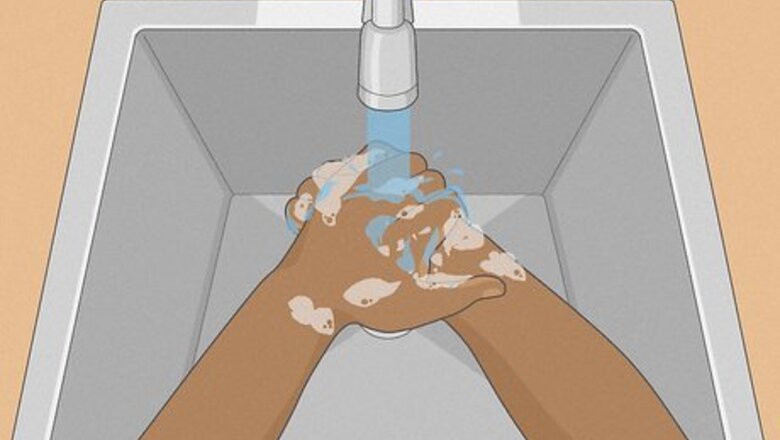
views
X
Trustworthy Source
Centers for Disease Control and Prevention
Main public health institute for the US, run by the Dept. of Health and Human Services
Go to source
Altering Your Personal Hygiene
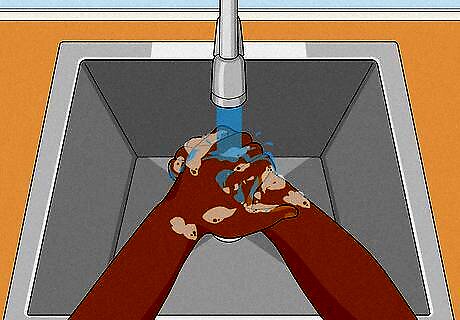
Wash your hands often. Inadequate personal hygiene, especially in regards to hand washing, is one of the fastest ways pink eye spreads. Wash your hands often, especially after touching your eye or face and after applying eye drops. Use soap and warm water or, if unavailable, alcohol-based hand sanitizer that contains at least 60% alcohol. Wet your hands with running water (warm or cold) first and then turn off the tap. Lather your hands with soap. Be sure to lather the back of your hands, between your fingers, and under your nails. Scrub your hands for at least 20 seconds. If you're having trouble keeping track of time, try humming "Happy Birthday" twice. Rinse your hands under running water and dry them with a clean washcloth or a paper towel.
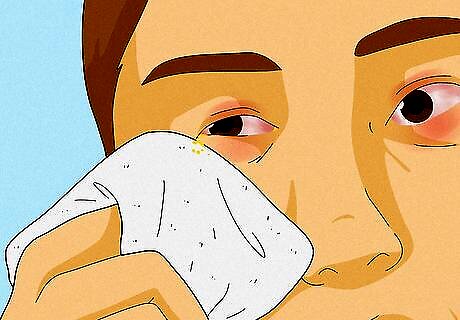
Wash the discharge from your eye several times a day. Discharge from your eye can drip and spread the disease, so make sure to wash any discharge several times a day. Use a moist cotton ball, tissue paper, or a clean, wet washcloth. Wipe from the inside corner of the eye to the outside corner, using a clean part of the cotton ball or towel for each wipe. When you are finished, discard the cotton ball or wash the towel thoroughly, using laundry detergent and warm water.
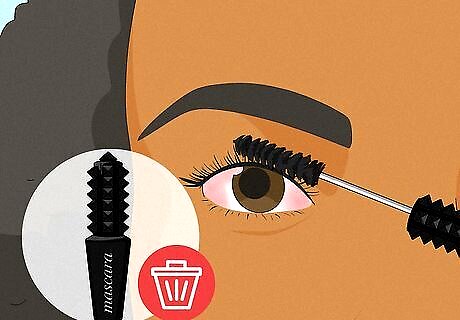
Throw away or clean items that had contact with your eye. Once the virus passes, you need to prevent reinfection. This can be done by disposing of or cleaning any items that had close contact with your eye during or shortly before the infection. Throw away any eye-make up, such as mascara and eyeshadow. In fact, it's best not to wear eye makeup at all during an infection. Throw away any contact lens solution used during or before the outbreak of symptoms. Any disposable contact lenses should be thrown away. If you use extended wear contacts, clean them as directed on the box. Throw out the contact lens case and get a new one to use after your infection has cleared. You should not wear contact lenses during a pink eye infection. Clean eyeglasses or cases used during the infection.
Taking Precautions at Home
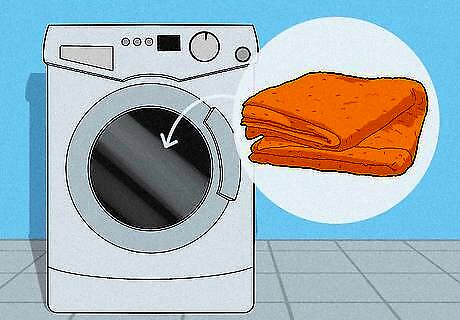
Clean linens and pillowcases. The discharge that comes from your eye during an infection can leak onto towels, pillowcases, linens, and washcloths. Such items should be cleaned daily for the duration of an infection. Wash them in hot water and detergent, and wash your hands after handling such items.
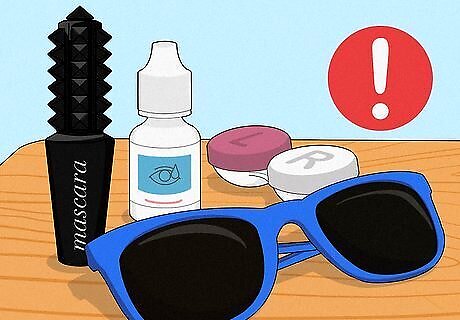
Do not share certain items with other members of your household. In general, anything that has close contact with your eye or another household member's eye should not be shared during a pink eye infection. This includes: Contact lens equipment, containers, or solutions. Towels, washcloths, and pillowcases Eye drops (However, you have a young child you may need to help him or her apply eye drops. Wash your hands before and after applying eyedrops and wear gloves during the process). Any kind of eye makeup Sunglasses or eyeglasses
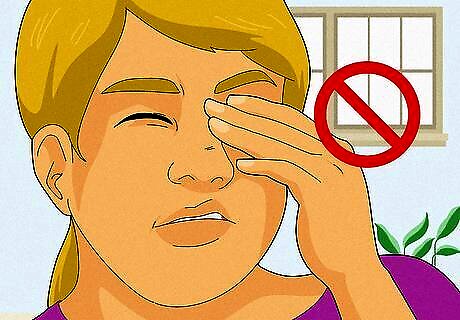
Avoid rubbing your eyes at home. While it might be tempting to relieve itch by rubbing, the practice should be avoided. Rubbing your eyes will, at best, temporarily relieve symptoms. It also spreads discharge to your hands, face, and nearby objects, which increases the chance of an infection spreading. To relieve symptoms, placing a damp washcloth over the infected eye is more helpful than itching. Use cold or warm water, depending on what feels best for you. After use, make sure the washcloth is either discarded or washed in warm water and detergent.
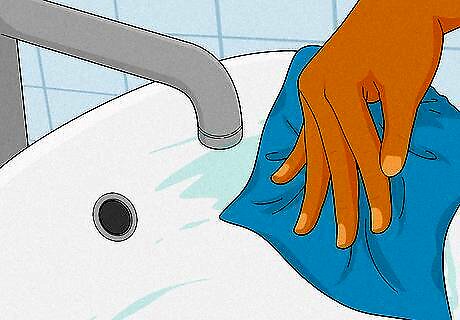
Clean surfaces in your home. Clean countertops, faucets, bathroom vanities, and shared phones with an antiseptic cleaner. Such surfaces have frequent contact with our hands and can contain traces of the discharge and fluids that lead to pink eye infections. Wash such surfaces frequently during an infection and then again after symptoms clear up. Also, when returning to school or work, clean off any work stations, keyboards, desks, and areas you had close contact with during your infection.
Caring for Your Eyes

Protect your eyes. Your eyes will be extra sensitive during an infection, and will require extra care. In the wind, heat, or cold, wear eye protection to prevent irritation. This can be in the form of goggles, eyeglasses, or sunglasses. Remember, however, such items should be washed thoroughly after use and after an infection clears up. If you work with chemicals, wear safety goggles. While this is a good practice in general, it's especially important to keep foreign materials out of the eyes during an infection.
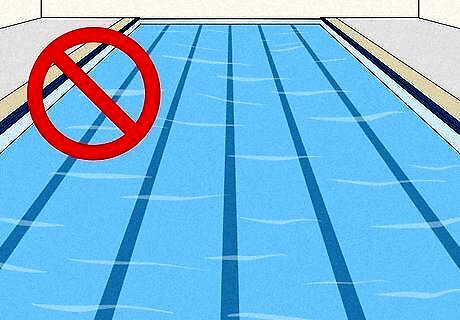
Avoid swimming pools. During an infection, avoid swimming pools. Bacteria is easy to spread via water and, if you do have contact with a pool for any reason, wear goggles and remove contact lenses before getting in the water.
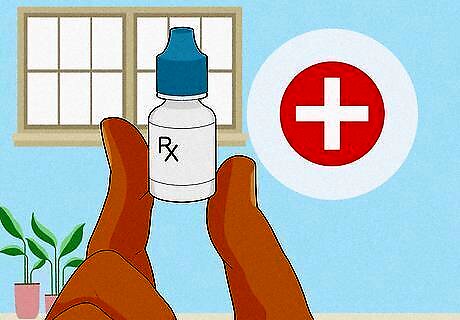
Use any antibiotics, ointments, or eye drops prescribed by a doctor. Use the medicine as directed and for as long as instructed, even if symptoms clear up. If you're applying drops, keep the bottle tip clean and do not let it have contact with the eye or eyelids.
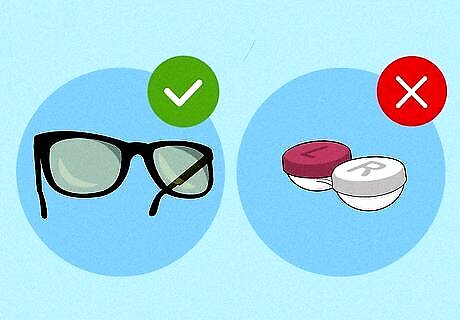
Wear glasses only. During a pink eye infection, you should not wear contact lenses. Wear glasses until symptoms have passed, and make sure to wash your contacts before putting them back in. Change your contact solution as well, as this is also likely infected. If you wear disposable contacts, it's best to err on the side of caution and put in a new pair.
Returning to Work or School
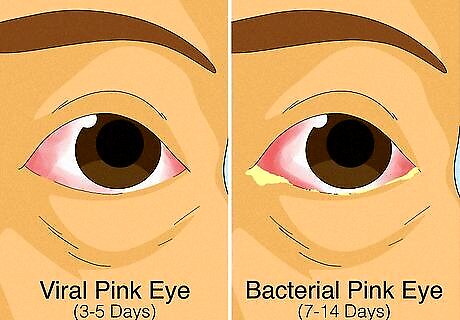
Know how long you will be contagious. There are two different types of pink eye that are contagious: viral and bacterial. The duration of the infection depends on its type. Know which type of pink eye you have contracted and how long you will need to take the above precautions to avoid spreading the infection. Viral pink eye is caused by the same virus that causes the common cold. It generally causes a watery mucous discharge. Symptoms usually improve within three to five days, but can last as long as two weeks, and medicines are not usually prescribed. Bacterial pink eye is caused by bacterial infections and causes redness in the eye and a lot of pus. Antibiotics are usually prescribed for seven to 14 days. Symptoms clear up shortly, and a person is generally not contagious after treatment.
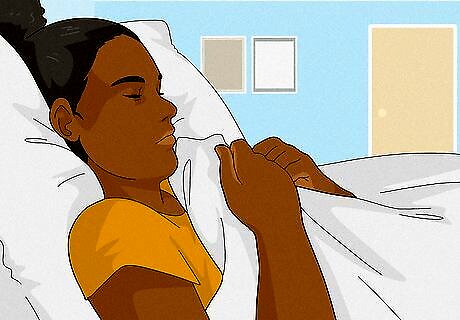
Stay home until the infection passes. If possible, you should stay home from school or work until your infection clears up as bacterial and viral pink eye are highly contagious. In general, pink eye remains contagious as long as the eye continues to tear and produce drainage. It should clear up within three to seven days.
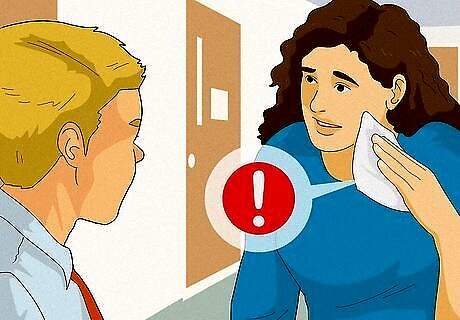
Take precautions when returning to work or school. If you wait until symptoms clear up, you should not be contagious upon returning to work or school but should still take certain precautions to avoid reinfection. Do not share eye makeup, eye drops, sunglasses, handkerchiefs, or other items that come in close contact with your eyes with fellow students or coworkers. Let people know you had a pink eye infection so they can take proper precautions to avoid becoming infected themselves.
















Comments
0 comment